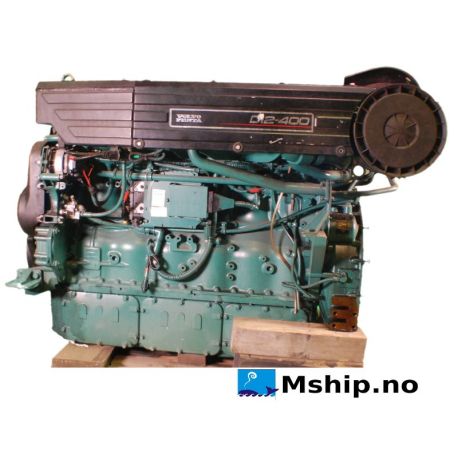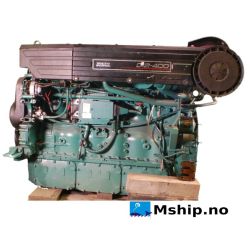Volvo Penta
- Vessels
- Engines / equipment
- Propulsion engines
- Allen Diesel
- B&W Alpha
- Pegaso Guascor
- MTU
- Iveco Aifo
- Deutz
- Detroit Diesel
- DAF
- Volvo Penta
- Gardner
- Cummins
- Valmet
- MWM
- Bergen Diesel
- Callesen Diesel
- Grenaa Motor Fabrik
- MAN B&W
- Hyundai
- Caterpillar
- Lister-Blackstone
- MaK
- GMT
- Mirrlees Blackstone
- Nohab Polar
- Paxman Diesel
- MAN
- Mitsubishi
- Scania
- Stork Werkspoor
- Wärtsilä
- Stork Wärtsilä
- Yanmar marine engines
- Mercedes marine diesel
- Wizeman marine diesel
- EMD
- Baudouin
- Normo Diesel
- Sulzer
- Ruston
- Ford
- INDUSTRIE
- Crepelle
- WÄRTSILÄ WICHMANN 28
- MWM DITER
- SKL
- Buckau Wolf
- Isuzu
- NOGVA
- John Deere
- marine gearbox
- RAPP FJELLHAMAR
- VOLDA
- FINNØY
- LIAAEN
- MEKANORD
- Lohmann & Stolterfoht
- HYTEK
- KUYPERS Gears
- GUASCOR
- Twin Disc
- Pay & Brinck
- B&W Alpha
- REINTJES
- Ulstein propeller
- Masson Marine
- MIRRLEES BLACKSTONE
- HJELSET
- Heimdal Propulsion
- RENK
- Norgear - Kumera
- Zamech
- Fernholdt & Giertsen
- ZF Marine
- Lister Blackstone
- Rhenania
- Nico
- Engrenages et Reducteurs
- TACKE
- Capitol marine gear
- Korsør
- Callesen gear coupling
- Nogva Heimdal
- SCG Self-Changing Gears
- Generators
- Air compressor
- Offshore - installation - decommission - salvage
- Hydraulic pump
- Water Pumps
- Three Screw Pumps
- Heat exchangers
- Electric motors
- Generator sets
- Ship interior
- Oily water separator
- Transformers
- ELECTRONIC EQUIPMENT
- Hydraulic powerpacks
- Engine Control Systems
- Oil separator
- Governor / actuator
- Deck equipment
- Filter
- Hydraulic motor
- Cooling compressors
- TURBO
- Propulsion engines
- Spare parts
- MTU original spare parts
- Detroit spare parts
- MAN B&W spare parts
- Mak spare parts
- Nohab Polar spare parts
- GMT spare parts
- Deutz spare parts
- B&W Alpha spare parts
- MWM spareparts
- Scania spare parts
- Callesen spare parts
- Electric and Electronic spare parts
- MAR-EL
- Kongsberg Autronica
- Robertson
- Hydraulic Brattvaag
- Ulstein Marine
- PHONTEC
- Penny & Giles
- Elmatic
- AUTO-MASKIN
- HELITRON
- Bosch
- Paab
- Mean well
- Pikotec OY
- Praxis Automation
- Brunvoll
- Saia-Burgess
- Rolls-Royce
- Kongsberg
- Wartsila
- Danica Supply
- Kongsberg KaMeWa
- JRCS
- Emerson
- Vickers
- Polyamp
- KARISMAR
- NORSEligth
- Various electronic spares
- IDEC
- Siemens
- CAREL
- Rexroth
- Leroy-Somer
- Wika
- Phoenix Contact
- Terasaki
- JRC
- Hirschmann
- Beijer Electronics
- ABB
- DEIF
- MGV Stromversorgungen
- Lilley & Gillie
- Fire alarm systems
- TOKIMEC
- SYSLOGIC EUROLOG
- F. K. SMITH AS
- MARINEX
- Intelligent Instrumentation
- Semikron Danfoss
- Vicor Corporation
- Mitsubishi
- O.Øverland AS
- Boolean
- SCHOTTEL
- RHEINTACHO
- SMART Automation
- JUNG-A MARINE
- Lilaas
- lilaas
- Moxa
- TT Electronics
- Merlin Gerin
- Dräger
- SELCO
- TERASAKI
- Denison Hydraulics
- Fuji Electric
- PEP Modular Computers
- Pelco
- FSG Fernsteuergeräte
- Raytheon
- Wago
- Bergen Diesel / ROLLS-ROYCE MARINE Orignial spares
- Volvo spare parts
- Gardner spare parts
- Ruston spares
- L’Orange
- Normo spare parts
- MWM DITER
- Sulzer spares
- Wärtsilä spares
- Yanmar spare parts
- Hatteland Display
- PISTON RINGS
- Roller bearings
- Wichmann spare parts
- MAN Spare Parts
- AMOT
- TURBO
- Subsea noise mitigation
Viewed products
-

Volvo Penta D12D-B MH
Volvo Penta D12D 400 Two units...
New products
-

Mitsubishi AL2-14MR-D
Mitsubishi AL2-14MR-D
-

Mitsubishi AL2-2DA
Mitsubishi AL2-2DA
-

TOCOS RA30Y 30S B251 potentiometer
TOCOS RA30Y 30S B251 potentiometer
-

FSG PK 620 - 46 M III d Precision Potentiometer
FSG PK 620 - 46 M III d Precision Potentiometer
-

Yanmar 153605-11350 Bolt M12X265
Yanmar 153605-11350Bolt M12X265
-

Scania DI 12 62M 285 kW @ 1800 RPM
Scania DI 12 62M285 kW @ 1800 RPM
Volvo Penta D12D-B MH
4443664
Used
Volvo Penta D12D 400
Two units available, see also: http://mship.no/volvo-penta/123-volvo-penta-d12d-b-mh.html
Data sheet
| Manufacturer | Volvo |
| Model | D12D-B MH |
| Serial number | 1012496332 |
| Performance specification | 868944 |
| HP | 395 |
| kW | 294 |
| RPM | 1800 |
| Cylinder bore | 131 mm |
| Piston Stroke | 150 mm |
| Number of cylinders | 6 |
| Displacement | 12,13 Liters |
| Cylinder configuration | In line |
| Rotation direction | CCW - Counter clockwise seen from aft |
| Fuel Type | Diesel |
| Weight | Dry weight bobtail 1400 kg. |
More info
Volvo Penta D12D-B MH
D12 in three different versions for marine propulsion
| D12-550 | D12-450 | D12-400 | |
| Cylinders | in-line 6 | in-line 6 | in-line 6 |
| No. of valves | 24 | 24 | 24 |
| Displacement | 12.1 liters | 12.1 liters | 12.1 liters |
| Crankshaft output | 550 hp/405 kW | 450 hp/331 kW | 400 hp/294 kW |
| Max. torque crankshaft | 2,256 nm | 2,056 nm | 1,858 nm |
| Dry weight excl. reversing gear | 1,400 kg | 1,400 kg | 1,400 kg |
| Rating * | 2 | 1 | 1 |
* 1 = Heavy duty commercial
* 2 = Medium duty commercial
Volvo Penta D12 heavy duty: marine diesels
D12 Heavy Duty – a 12-liter marine diesel that, with its totally electronic control, for heavy commercial operations.
The D12’s new electronics not only provides more efficient combustion with improved performance, lower fuel consumption and reduced emissions, but also increased reliability with improved safety and a longer operating life for the engine. All this makes the D12 a highly economical and effective machine for demanding commercial applications such as ferries, fishing boats and other work boats in continuous operation. In addition, there is a D12 version for marine auxiliary functions, and as a complete generator unit.
The D12 is an in-line, six-cylinder marine diesel, endowed with the latest technology to the last detail. Unit injectors, EDC system and an extremely sturdy basic design, including a seven-bearing crankshaft are among the solutions employed. The result is an engine with high output and powerful torque which, at the same time, is fuel-efficient and has low emissions. In addition, reliability and anticipated economic life are at very high levels.
“The electronics system used in the engine is one very important reason for the engine’s high operating safety and reliability. The EDC system continuously monitors and controls the engine, enabling it to always operate under optimal conditions. The system also includes a number of safeguard functions that dramatically reduce the risk of engine damage,” says Anders Hård, who is D12 project leader at Volvo Penta.
Easy to operate and safe
Torque – engine output – is wholly decisive for operation at low speed. The new D12 has slightly more than 50% greater torque than its predecessor, and the captains of vessels where the test installations have been conducted are highly satisfied with the improved operating characteristics the new engine provides.
Low operating cost and low emissions
For demanding commercial applications, the engine’s operating life, fuel consumption and service costs are wholly decisive for the overall economy. The new D12 has efficient combustion due to its unit injectors that operate under extremely high pressure, up to 1,800 bar, five-hole injection nozzles and the EDC system’s precision control. Extensive test operations and experience from other Volvo companies demonstrate that the D12 has a very long anticipated service life, with simple, uncomplicated service.
Emission levels are extremely low due to efficient combustion and the EDC system’s precision engine control. Another function is that the fresh-water cooled charged-air cooler has been connected with the engine’s cooling system to avoid unnecessary cooling of the charge air, enabling reduced exhaust emissions when idling. The D12 fulfills all existing emission stipulations governing commercial operation and also the upcoming European and US standards.
Totally electronic engine
The Electronic Diesel Control, EDC, provides precision engine control and increased safety due to a number of information providers and an advanced central unit which continuously monitors all functions. All connections are plug-in type and effectively protected to stand up to a marine environment.
Quality
An engine that must operate around the clock, not infrequently in the worst conceivable conditions, must of course be sturdy in design. The basis for the D12 is a very strong, cast engine block.
To ensure long service life, cooling is important. The D12 has fresh-water cooling in a closed system for both engine and charged-air cooler. The cooling-water filter has a corrosion additive that facilitates for long intervals between replacements. The cooling-system volume is also sizable, enabling the connection of a keel cooling system. The pistons are oil-cooled, with the entire cooling system monitored by the EDC system. If the engine temperature rises excessively, the EDC system limits output to prevent any damage to the engine.
The D12 is manufactured at Volvo’s engine plant in Skövde. This is one of the world’s most highly automated diesel plants, with engines built with exacting precision. The engines are made adapted for marine applications at the Volvo Penta plant in Göteborg, with each engine being test-operated with all extra equipment, controls, instruments, etc. mounted.
Comprehensive testing program
The D12 underwent a highly comprehensive testing program prior to its introduction. Tests in laboratories have been combined with tests at sea at Volvo Penta’s own testing center in Göteborg, and a test installation on a ferry in regular traffic. Overall, 15,000 hours have been expended in the laboratory and 18,000 hours at sea. The distance at sea is the equivalent of eight circumnavigations of the earth.





